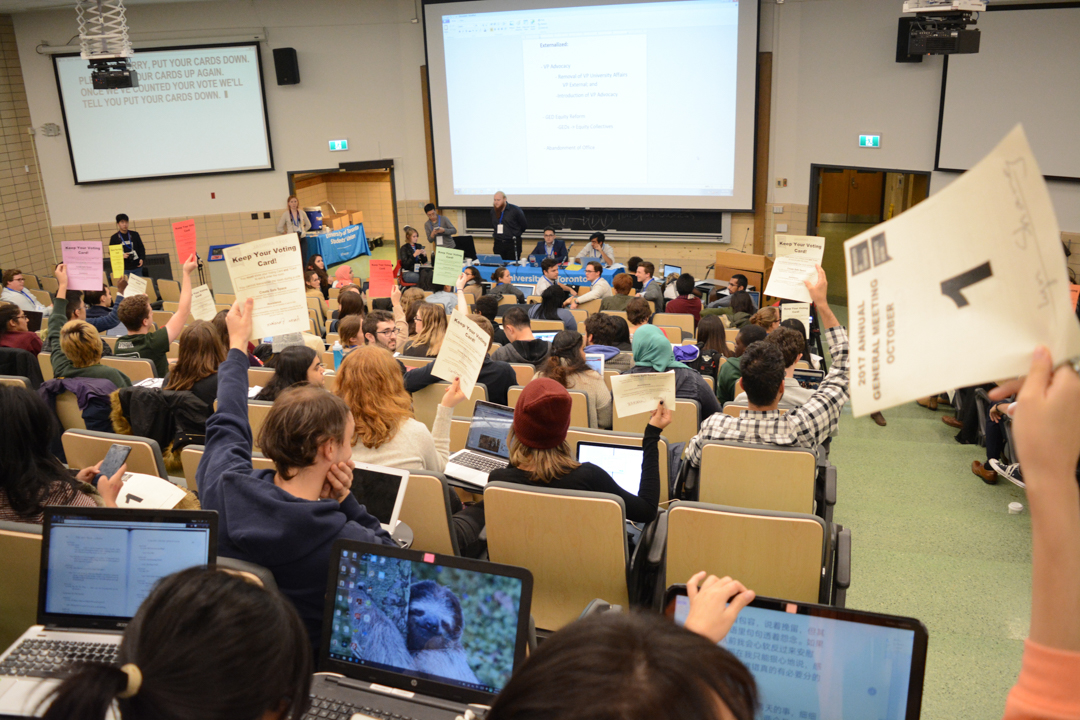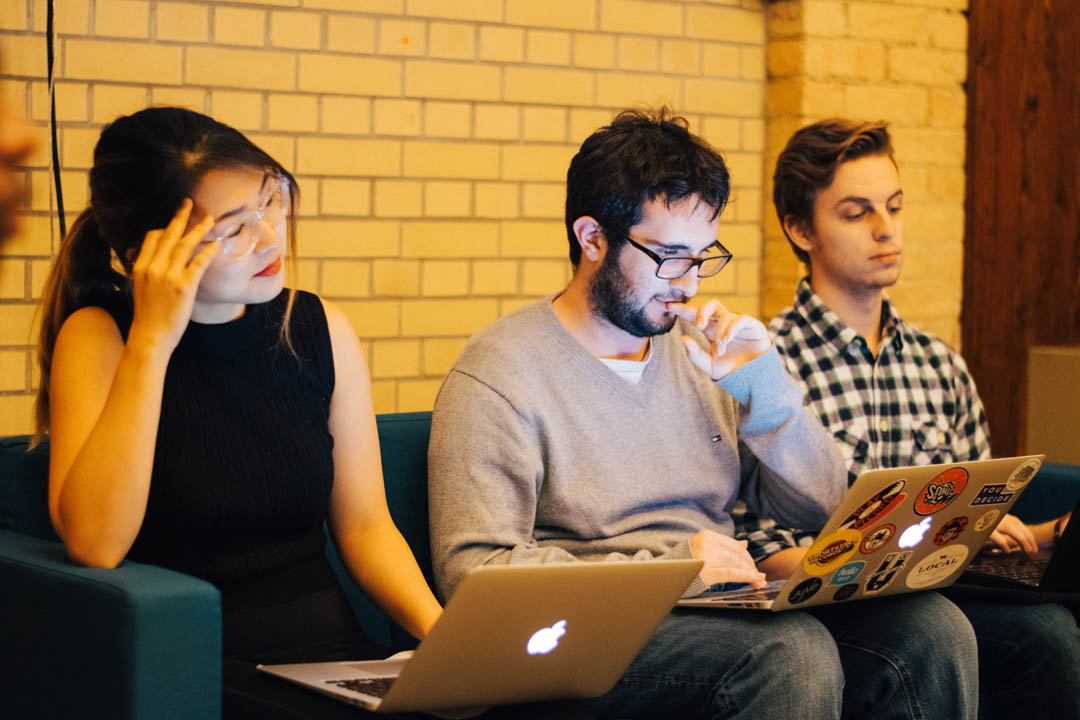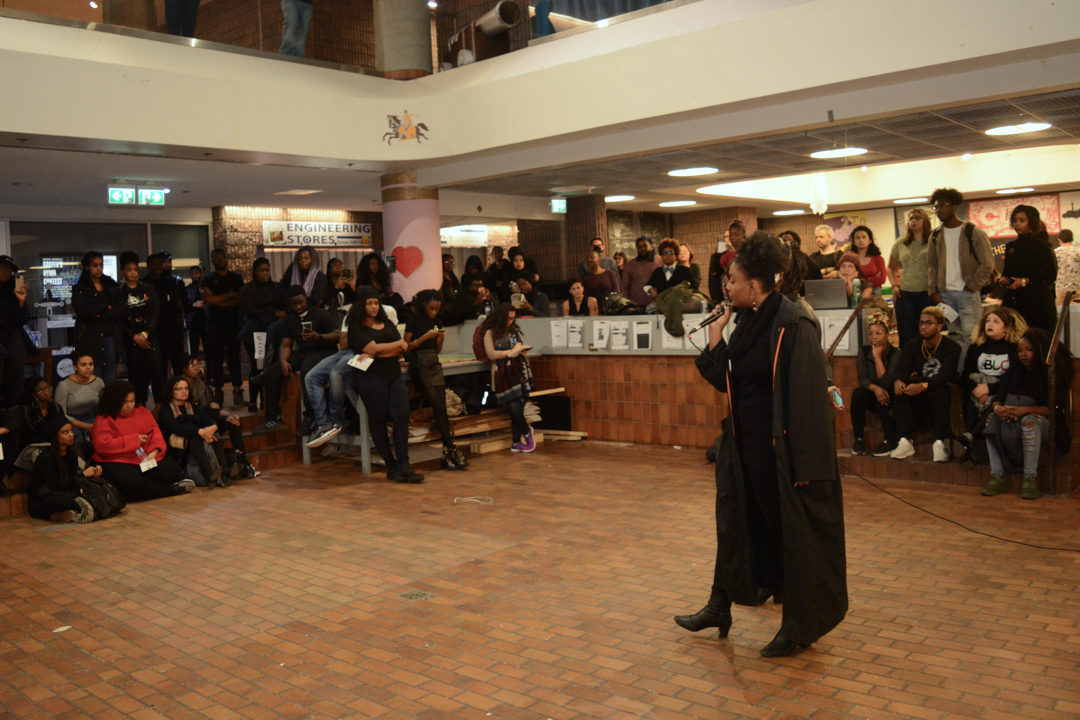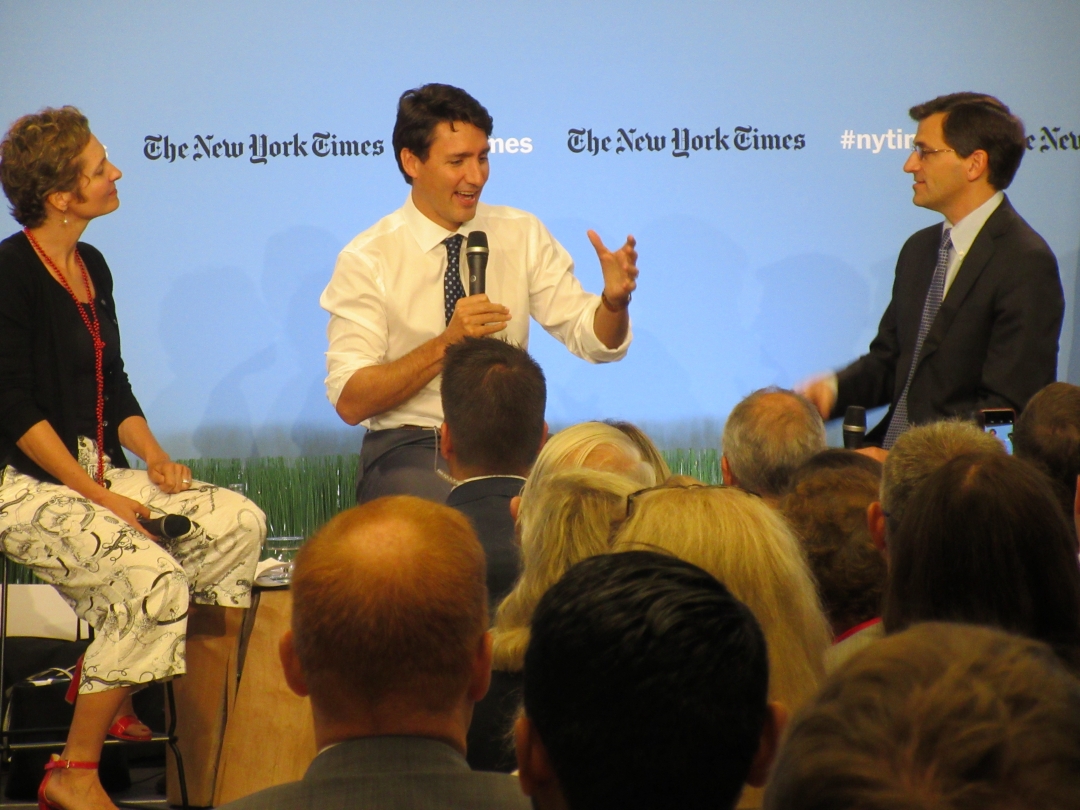As far as years go, 2017 was a kicker. World politics is a dumpster fire, and a deeply distracting one at that. Within this generally turbulent international political climate, everything can appear devastating, and the doom and gloom of international headlines can feel incredibly disempowering.
What is happening in the world might cause us to lose sight of the subtle but pernicious ways in which university affairs have impacted life at the University of Toronto as well. We might also forget that, as students at the largest university in Canada, we have vital bargaining power, and we shouldn’t shy away from trying to make a difference in our immediate community. While stepping into the ring with political moguls might seem like a pipe dream, students retain the power to affect change locally, at the very least.
The start of 2018 provides us with ample opportunity for reflection and analysis. I asked six Comment contributors to write about key events and phenomena that forged 2017’s trajectory, both at the university and in the world at large. Going forward, let’s remain vigilant about macro-level political affairs — but let’s also keep local issues situated in our sightline.
Happy new year. Stay political.
Teodora Pasca
Comment Editor
ON CAMPUS

Students voted down a motion to merge two executive positions during the UTSU AGM. STEVEN LEE/THE VARSITY
UTSU AGM REMINDED US WHERE POWER LIES IN STUDENT GOVERNMENT
Instead of preparing their Halloween costumes, over 90 U of T students spent the evening of October 30 hotly debating motions at the Annual General Meeting (AGM) of the University of Torotno Students’ Union (UTSU). Taking centre stage was a motion to combine the executive positions of Vice-President External and Vice-President University Affairs into the proposed new role of Vice-President Advocacy. The motion had been passed by the UTSU Board of Directors, but it needed to be approved at the AGM to take effect for the next election cycle. While other motions in the same position passed easily, members decisively voted this one down — an important reminder of the power students can wield when they disagree with student politicians.
Those who take on roles in student government often do not seek power or pay — there are arguably easier ways to obtain both — but rather seek to contribute to their communities. Leaving aside questions about the merits of this motion, the events of the AGM showcase an idea fundamental to student government: it exists not for student politicians, but for their constituents, meaning by consequence that decision-making authority ultimately rests with the student body at large.
While true for the UTSU, this can also be said of student governments at this university that receive much less attention, from course unions to divisional student societies. A brief survey of the Canadian Studies Students’ Union, the Association of Political Science Students and the University College Literary and Athletic Society shows that their constitutions explicitly reserve for students the power to set direction and change structures by amending bylaws. While their 2017 general meetings were less controversial than that of the UTSU, the meetings still give students the opportunity to wield their power in student government.
What happened at the 2017 UTSU AGM should remind student governments, no matter their size, that they should seek to involve students as much as possible in their services and governance — or else they risk watching students vote down the fruit of their labour. Conversely, in 2018, students must seize the opportunity to use their power and engage with their representatives, demanding that their governments serve them better.
Andrew Kidd is a fourth-year student studying Engineering Physics. He is the Speaker of the Engineering Society.

Governing Council’s mandatory leave policy has faced serious criticism from students. ANDY TAKAGI/THE VARSITY
MANDATORY LEAVE POLICY REFLECTED STATE OF MENTAL HEALTH AT THE UNIVERSITY
It was announced in 2017 that Governing Council was considering a mandatory leave policy, which would allow the university to issue a non-punitive yet compulsory leave of absence on students “whose mental health issues posed a physical threat to themselves or others, or impacted their academics negatively.” The topic of the policy proceeded to occupy much campus discourse over the course of the fall semester, and it was met with a great deal of protest from mental health and student advocacy groups. Criticisms included its vague wording and the potential effects it would have on students in situations where their enrolment would affect their financial, housing, or immigration status.
The policy is an unsurprising move from a university that has been so utterly ineffective at helping students with mental illness, often failing to provide them with badly needed support. In my own experience with the Health and Wellness Centre, the waiting list for individual therapy can be anywhere from a month to much longer. Numerous complaints have been raised by students who feel they have had their mental health concerns dismissed by the university or who have otherwise been unable to access vital services.
The policy wouldn’t apply to students with a treatment plan who are able to attend classes — yet given the state of mental health services at U of T, students cannot always expect to have access to treatment. The impact of the policy could therefore be to punish students who seek help for mental illness, preventing them from asking for help in the first place out of fear of being removed, worsening an already difficult situation. As Governing Council prepares to vote on the mandatory leave policy in 2018, I can only hope that instead of seeking to remove students whose mental health prevents them from staying in university, they will take measures to improve existing support frameworks.
Adina Heisler is a third-year student at University College studying Women and Gender Studies and English. She is The Varsity’s Student Life Columnist.

The BSA organized a town hall in November as a response to racist incidents. STEVEN LEE/THE VARSITY
CAMPUS DEMONSTRATIONS SHOWCASED IMPORTANCE OF THE STUDENT VOICE
Many of us in 2017 bore witness to student action and involvement in campus politics and issues regarding equity and racism. Examples of such action were demonstrated throughout the year, serving as positive encouragement for students to actively voice their concerns on the issues that matter to them — personally, campus-wide, and internationally.
One of the most significant examples of this happened during the fall of last year. A group of students walked on stage at Isabel Bader Theatre in protest of the annual Keith Davey Forum due to its lack of diversity in the speaker panel and the irresponsible way in which the discussion question — asking if social inequality was “a real problem” — was posed. This protest led to the organizers admitting there were problems with the event, going as far as to say that another forum would be held with the issues at hand resolved.
More recently, after students came forward with evidence of racist remarks made on an engineering chat forum, the Black Students’Association organized a town hall on November 28 to discuss racism and to allow students to share their experiences of racial discrimination.
These events are a testament to the impact of the student voice and how it can positively influence events and programs on campus. Demonstrations and forums revolving around campus and international affairs are a vital example of the political involvement of students at U of T, and 2017 was no exception. An active and aware student body is a testament to an environment in which students are not afraid to voice their opinions and can ultimately become a source of social change.
Abdul Ali is a first-year student at St. Michael’s College studying International Relations.
WORLD

Bill C-6 is among the most significant federal laws passed in 2017, writes Maia Harris. DAVID RUSSO/CC FLICKR
BILL C-6 SOLIDIFIED FEDERAL GOVERNMENT’S COMMITMENT TO DIVERSITY
The Liberals’ Bill C-6 received Royal Assent on June 19, 2017, a clear sign of the Canadian government’s favourable stance toward immigration. Bill C-6 issues a series of legislative amendments that facilitate easier access to Canadian citizenship, a position that stands in contrast to the political atmospheres and anti-immigration policies that characterized other countries in 2017.
Bill C-6 came into effect amidst a year of wealthy, influential nations peddling policies that make it significantly more difficult for people to immigrate to their countries. The second tier of the United Kingdom’s statement of change tightening their immigration policy was released in 2017, while the American government’s travel ban was upheld by the Supreme Court as constitutional. The timing of Bill C-6 sets the stage for Canada to counter global political tides and lead as an open-door nation in 2018.
The bill repeals many of the previous Conservative government’s citizenship policies, including those implemented through Bill C-24, which allowed for increased liberty to revoke dual citizenship. Among the changes is a provision that greatly benefits international students seeking Canadian citizenship post-graduation: an applicant must only be physically present in Canada for three out of five years preceding their citizenship, which is more favourable than the previous terms mandating four out of six years of presence. Additionally, the revamped calculation method entails that time spent in Canada on a study permit will count toward the residency requirement. A temporary resident is now able to include one day present for every two days spent in Canada toward their requirement, up to a maximum of 365 days.
Bill C-6 stands among the most significant Canadian laws passed in 2017, and its effects will certainly be felt going forward. Potential outcomes include increased immigration rates as well as a possible boost of international students in Canadian schools. Overall, Bill C-6 sets Canada apart from the closed-door international agenda, and it lays the groundwork for an even more diverse nation.
Maia Harris is a first-year student at St. Michael’s College studying English and Political Science.

PM Trudeau with Catherine Porter (left) and Peter Baker (right) JACOB LORINC/THE VARSITY
WORLD POLITICS VEERED OFF THE LIBERAL-DEMOCRATIC TRACK
Last year saw the continuation of a struggle over the future of the international liberal-democratic order. Relatively uncontested until recently, this system was put into place following the Cold War, consisting of principles such as democratic values, economic liberalism, and interdependence guided by powerful supranational institutions. It was this establishment that Francis Fukuyama infamously called “the end of history” — yet in light of the events of this past year, such a thesis seems increasingly false.
US President Donald Trump, a candidate elected on an ‘America first’ platform of economic protectionism and xenophobia, was inaugurated early in the year. Some of the Trump administration’s actions in 2017 included various attempts at implementing travel bans for those coming from Muslim-majority countries, a war on “fake news,” withdrawal from the Paris Agreement, and the beginning of renegotiations on the North American Free Trade Agreement. Outside of Washington, events such as the Charlottesville rally reveal apparently anti-liberal movements on both the right and the left. On one hand, the ‘alt-right’ disavows diversity in favour of an American white ethno-state; on the other hand, leftist Antifa groups have engaged in violence and property damage at protests.
In contrast, Canada seems to be one of the states not moving in this direction. Conservative leadership candidate Kellie Leitch’s suggestion that immigrants be screened for “Canadian values” was resoundingly defeated, for example. Justin Trudeau has pursued liberal policies and has been presented as a worthy opponent to Trump in the international political context.
Outside of the US, far-right parties continue to influence European politics with protectionism, xenophobia, and anti-EU positions; in 2017, this was demonstrated through several key elections in the Netherlands, France, and Germany, the latter of which saw the introduction of a far-right party to the German Bundestag for the first time since World War II. In light of Germany’s post-war fear of Nazism, this is particularly significant, and it foreshadows a global trend away from the liberal status quo towards new directions — a trend that Canada will need to respond to.
Sam Routley is a third-year student at St. Michael’s College studying Political Science, History, and Philosophy.
NATIONALISM BLED OVER THE BORDER, THREATENED HUMAN RIGHTS AT HOME
We might like to think that society has progressed in terms of civil and human rights during the 21st century, yet looking back on 2017, this seems doubtful. Women’s rights, LGBTQ+ rights, and migrant rights have taken a hit in the US this year. Among oppressive policies, President Donald Trump said he would eliminate the diversity lottery for foreigners seeking US visas. Racism in political discourse has also been prominent — for instance, Republican state Senator John Bennett refused to apologize for his statement that American Muslims are a “cancer in our nation that needs to be cut out.”
What is important to remember, however, is that racism and oppression are hardly unique to the US. On Canada Day, a white nationalist group called the Proud Boys disrupted an Indigenous ceremony in Halifax. As Indigenous folks engaged in ceremony protesting Halifax’s founder, Edward Cornwallis — infamous for collecting bounty on Indigenous scalps — the group disrupted the ceremony and approached the gathering singing “God Save the Queen.” The Québec City mosque shooting occurred on January 29, when six worshippers were killed and 19 others were injured. Both of these acts of racism can arguably be linked to the influence of the US: the headquarters of the Proud Boys is located in New York City, while the Québec City shooter was allegedly a Trump supporter.
The development of civil and human rights has rightfully come a long way since slavery and women’s suffrage. However, as incidents of racism continue, it feels as though this progress is not as steady as we might hope. As 2017 has come to a close, we as Canadians should remember that, no matter the actions of the US, we do not have to follow their example. In 2018, we should focus on confronting hatred coming from abroad while also working to address it at home.
Areej Rodrigo is a third-year student at St. Michael’s College studying English and Theatre and Performance Studies.


